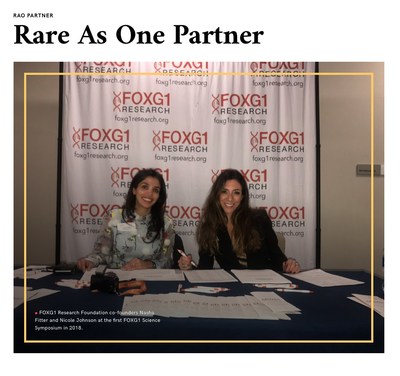The parent-led FOXG1 Research Foundation (FRF) announced today a nearly $500k grant from the Chan Zuckerberg Initiative (CZI) to revolutionize the ability for patient-led advocacy groups to use machine learning to help accelerate rare disease drug development.
| NEW YORK, Nov. 23, 2020 /PRNewswire/ -- The parent-led FOXG1 Research Foundation (FRF) announced today a nearly $500k grant from the Chan Zuckerberg Initiative (CZI) to revolutionize the ability for patient-led advocacy groups to use machine learning to help accelerate rare disease drug development. Understanding the natural history of a disease is an essential element to inform drug development. For rare diseases, there is often insufficient natural history data, making it difficult to advance the care of children and adults living with a rare disease. Rare diseases are defined as having less than 200,000 patients in the U.S., and many rare diseases have less than 1,000 patients worldwide. Thus, collecting necessary data from all patients is critical to accurately understand the disease. Currently, patients must travel to select academic centers to be part of these studies. This becomes difficult for patients with complex medical needs, accommodation challenges, and for those who cannot lose work time. These aspects reduce participant enrollment and retention. Costs to patient organizations for studies can exceed $10,000 per subject per year and participants typically do not have access to study results — all limiting patients’ access to and engagement in rare disease research. Thanks to two years of planning and this grant from CZI, the FOXG1 Research Foundation is launching a groundbreaking study using technology and machine learning to supplement the current NHS model by digitally collecting and analyzing critical patient data in order to scale rare disease research without exponential cost. Most importantly, this model allows patients direct access to their consolidated, digitized data that also uniquely summarizes their experience, which can be used to get second opinions or share with multiple providers to facilitate and improve their care. “In order to find cures for rare diseases, all aspects of drug development need to be democratized, especially the collecting, analyzing and sharing of patient data to better understand unknown diseases. This has to be easy for the patient, affordable for the advocacy group, and totally accessible for researchers,” explains Nasha Fitter, CEO and cofounder of the FOXG1 Research Foundation. The new digital Natural History platform is launching with four rare disease groups: FOXG1 syndrome (FRF), SLC13A5 deficiency (TESS Research Foundation), SYNGAP1-related disorder (SynGAP Research Fund) and Rett Syndrome (Rett Syndrome Research Trust). These advocacy groups are at the forefront of rare disease research and are dedicated to redefining the drug development process. For some of these groups, natural history studies already exist and this digital platform will augment the existing NH dataset and provide a valuable and unique service to families and researchers. Accumulating data on multiple rare disease groups also enables cross-referencing for potential therapies. In a partnership with Ciitizen, a Palo-Alto medical records platform provider, the rare disease groups kicking off this new model will onboard patients (caregivers) to sign up on the platform that will digitally collect the patient’s medical records on their behalf, and then the anonymized data will be extracted and available for clinicians, researchers and biopharma to aid in research and therapy development. Researchers will be able to access large amounts of data for these small diseases to help determine clinical endpoints for potential treatments. Key benefits of this new Digital Natural History Study include:
“We’re excited to support the FOXG1 Research Foundation’s efforts as they spearhead innovative work to accelerate patient access and engagement in rare disease research,” said Tania Simoncelli, Director of the Science in Society Program at CZI. “We expect this effort will produce learnings and applications relevant to the broader rare disease community.” The FOXG1 Research Foundation is proud to be a Chan Zuckerberg Initiative Rare As One Strategic Partner. For more information about the Rare As One Network please visit our webpage. About the FOXG1 Research Foundation: Founded in 2017, the FRF is a 501(c) parent-led global organization dedicated to funding science along the path to a cure and therapies for children and adults who are afflicted with the severe, rare, neurodevelopmental genetic disorder called FOXG1 syndrome. FOXG1 syndrome is characterized by severe developmental, cognitive, and physical disabilities, and epilepsy. For more information, please visit www.foxg1research.org. About the Chan Zuckerberg Initiative: Founded by Dr. Priscilla Chan and Mark Zuckerberg in 2015, CZI is a new kind of philanthropy that’s leveraging technology to help solve some of the world’s toughest challenges — from eradicating disease, to improving education, to reforming the criminal justice system. Across three core Initiative focus areas of Science, Education, and Justice & Opportunity, we’re pairing engineering with grant-making, impact investing, and policy and advocacy work to help build an inclusive, just and healthy future for everyone. For more information, please visit www.chanzuckerberg.com. Media Contact:
SOURCE FOXG1 Research Foundation; SynGAP Research Fund |





